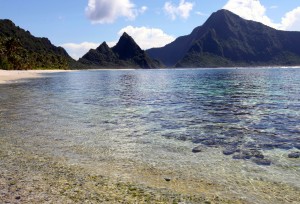
Beneath the sea, in the fight for survival, coral reefs are thriving in the turquoise lagoons of a tiny, volcanic outcrop island called Ofu. This island in American Samoa houses the Muhammad Ali of corals, able to thrive in temperatures that would knock out most counterparts.
Tough corals like these may be among the last line of defense for one of the most diverse ecosystems in the world. Coral reefs are under distress across the world due to rising seawater temperatures and increasingly acidic ocean conditions. Those climate change related threats are compounded by everything from coastal pollution to overfishing to spreading epidemics of coral disease. This is bad news for local communities, commercial fisheries, and thousands of reef species themselves.
Coral reefs occupy less than 0.1 percent of the world’s marine environment, yet they support almost one third of the world’s marine fish species. They are hotspots of diversity and life, sometimes called the rainforests of the sea.
This spring, six scientists set out to find coral species tough enough to withstand all these insults. The team, led by Stanford University marine ecologist, Stephen Palumbi set out for American Samoa and the Cook Islands, a location where they hoped to find evidence for more strong corals. They went armed with a coral stress tank, designed to mimic the conditions of extreme warming, to help them separate the tough corals from the wimps. The team’s first stop was the island of Ofu, where tough corals had been previously tested, followed by an unexplored site at Rarotonga in the Cook Islands. At both sites, small pieces of coral were removed from the reef and placed in the stress tanks to test their heat threshold. The corals are then submerged in sea water inside the tank and exposed to severe temperatures. What Palumbi and his colleagues found was surprising.
“Ofu is winning!” said Palumbi triumphantly after returning from the South Pacific, “but Rarotonga is not far behind.”
Ofu corals don’t bat an eyelash when plunged into 91-degree water. Rarotonga counterparts begin to bleach and show other signs of stress at this temperature. Bleaching is a stress response a little like a tree dropping its leaves to save water in a drought. Rather than losing leaves, corals, lose the tiny photosynthesizing algae that live inside each coral cell and supply much of the corals’ energy, as well as lending them their vibrant colors. Bleached corals are not dead, but they’re headed that way fast if the stressful conditions don’t let up.
“Even these strong corals, when pressed hard enough, can bleach in severe heat,” said Ph.D student and Ofu researcher Rachael Bay. Though they aren’t bulletproof, corals capable of withstanding intense heat may warrant special study and protection. Evidence from ancient episodes of warming shows that corals can adapt to a changing climate, but scientists aren’t sure whether they can adapt fast enough to survive the current global warming. Bay hopes that by studying the genes of corals that naturally occur in hotter environments, she’ll be able to find a signature for resilience in their DNA.
“Protection of these populations is crucial as they may provide a key to future adaptation of coral reefs to climate change,” said Stanford coral reef ecologist Fiorenza Micheli, who was not involved in the current study. Next, Palumbi plans to convince the government of the Cook Islands to work towards protecting tough corals from other dangers as well as to get local scientists in American Samoa to monitor the corals at Ofu.
Even the toughest of heavyweights, after all, never go into a bout without a lot of supporters in their corner.
